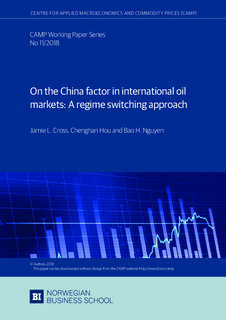On the China factor in international oil markets: A regime switching approach
Working paper

Åpne
Permanent lenke
http://hdl.handle.net/11250/2577653Utgivelsesdato
2018Metadata
Vis full innførselSamlinger
Sammendrag
We investigate the relationship between world oil markets and China's macroeconomic performance over the past two decades. Our analysis starts by proposing a simple method for disentangling real economic activity stemming from China and the rest of the world. We then consider a suffciently large set of dynamic VAR models to distinguish between abrupt and gradual changes in the macroeconomic relationships and volatility clustering in the shocks. A model exercise shows that a Markov-switching model is preferred to previously used models in the literature. When investigating the role of oil market shocks on China's output, we find that oil supply shocks tend to elicit a positive response, while the response of oil demand shocks is negative. Next, when analyzing world oil price dynamics, we find that demand shocks have had significant positive impacts over the past two decades. The average proportion of oil price variation explained by demand from China and rest of world demand are around 30 percent over the sample period. Importantly, while China specific effects are relatively constant, rest of world aggregate demand shocks are found to have larger impact during times of global macroeconomic downturn. This highlights the importance of our model comparison exercise. Finally, we find that the recent 2014/15 oil price drop was due to a combination of increased oil supply and decreased demand from China.